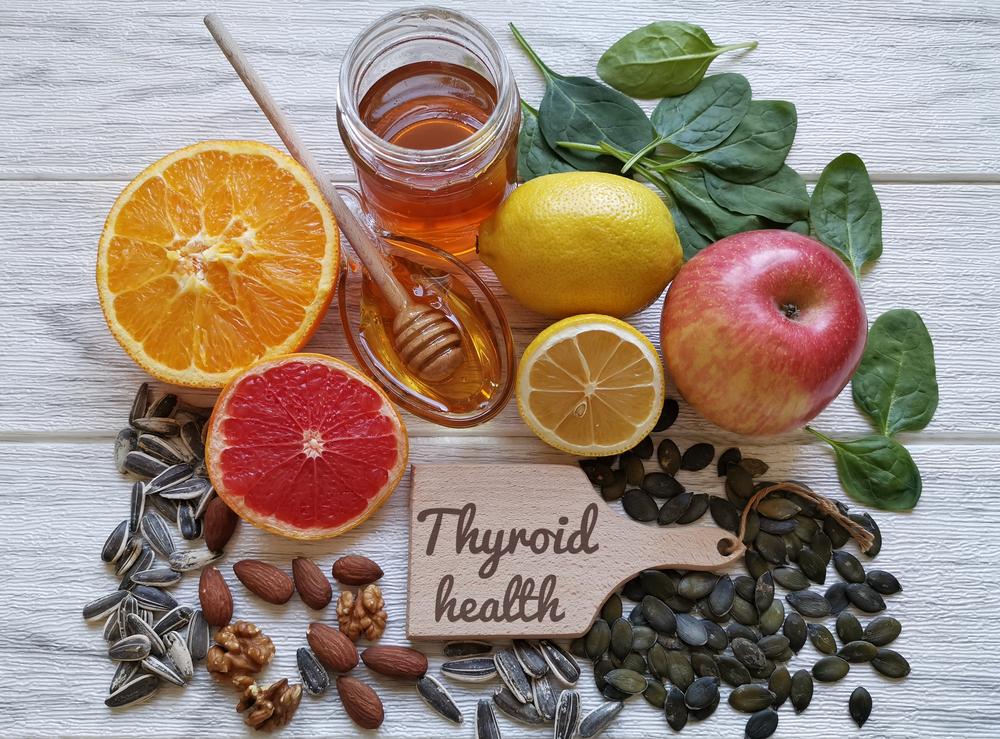Is your thyroid working properly? What thyroid diet to adopt for hypothyroidism? What is all this hype about hypothyroidism?
Before discussing the thyroid diet, let’s get to know what the thyroid is and what it does for your body.
Table of Contents
Thyroid: Tiny But Mighty Gland
Your thyroid, a small, butterfly-shaped gland at the front of your neck under your skin, makes and releases thyroid hormone. It’s a part of your endocrine system.
The thyroid hormone is the hormone that’s mainly responsible for controlling the speed of your body’s metabolism. In infants, thyroid hormone is critical for brain development.
So, that makes it a pretty important hormone, right? But what happens if the thyroid gland is unable to secrete a healthy amount of thyroid hormone? It gets problematic.
One of the most common thyroid issues?
Hypothyroidism. It’s a condition that occurs when the body doesn’t make enough thyroid hormone, versus hyperthyroidism, in which your body makes too much thyroid hormone.
Hypothyroidism is more prevalent and people all around the world often succumb to it. Studies show that women are more prone to thyroid diseases than men.
Keep on reading to find out what foods to eat and what foods to avoid for your thyroid health:
Thyroid Diet: Superfoods for Thyroid
There are plenty of foods that support healthy thyroid function. With Hypothyroidism, you must take foods that stimulate the thyroid hormone to release a steady flow of thyroid hormone.
Get Your Fill of Iodine: Eat Fresh Eggs & Dairy
Iodine is a mineral that is required for the production of thyroid hormones. As a result, persons who are deficient in iodine may be at risk of hypothyroidism.
Iodine deficiency is quite widespread. It affects roughly a third of the global population.
If you’re deficient in iodine, try adding iodized table salt to your meals. You can also increase your intake of iodine-rich foods like seaweed, seafood, dairy, and eggs.
Dairy products like yogurt, ice cream, and milk contain iodine. The thyroid needs iodine to prevent its glands from becoming enlarged, a condition known as goiter.
Treat yourself to a low-fat serving of frozen yogurt to get sufficient levels of iodine.
Supplementing with iodine is unnecessary because you can obtain enough iodine from your diet. Too much of this mineral may harm the thyroid gland. So, use it with care.
Read more about the benefits of milk to boost your health.
Choose Nuts and Legumes as Thyroid Diet!
Selenium aids in the “activation” of thyroid hormones, so the body can use it.
This mineral also has antioxidant properties. It may protect the thyroid gland from free radical damage.
Increase your selenium levels by eating selenium-rich foods e.g. nuts, legumes, walnuts, eggs, and tuna.
Eat Some More Zinc With Chicken, Beef, and Oysters
Zinc aids in the “activation” of thyroid hormones in the body.
Zinc may also assist the body manage thyroxine, the hormone that tells the thyroid gland to release thyroid hormones.
If you have hypothyroidism, you should consume extra zinc-rich foods such as oysters and other shellfish, beef, and chicken.
Which Foods to Avoid for a Healthy Thyroid?
Eating smart can help you feel better despite the condition. Here are some foods to limit or avoid as you manage hypothyroidism:
Soy-Based Foods
According to our top dietitian Dr. Abdul Rafay, foods containing soy, such as tofu, soy milk, and edamame, may interfere with the way your body absorbs thyroid medicine.
You don’t have to completely avoid soy-based meals, but you should consume them in moderation and wait several hours after taking your medicine before eating them.
Cruciferous and Leafy Vegetables
If you have hypothyroidism, you should consume your fresh vegetables!
However, avoid eating too much cabbage, broccoli, kale, brussels sprouts, cauliflower, and spinach. These vegetables have more goitrogens than their vegetable counterparts.
But don’t eliminate them entirely. You still need the good nutrients from the leafy vegetables. Just don’t overdo eating them.
Read more about spinach’s benefits for your health.
Sugary Foods Like a Delicious Chocolate Cake
Hypothyroidism can cause the body’s metabolism to slow down.
That means it’s easy to put on pounds if you aren’t careful. You want to avoid foods with excess amounts of sugar because it’s a lot of calories with no nutrients.
It’s best to reduce the amount of sugar you eat or try to eliminate it completely from your diet.
Be Wary of Gluten!!
Hypothyroidism puts some people at a higher risk of getting celiac disease.
Although it’s uncertain whether gluten-free diets are beneficial for thyroid conditions, if you’ve also been diagnosed with celiac disease, you should limit or eliminate gluten.
Avoid Processed and Packaged Foods
Sodium is high in processed foods, and persons with hypothyroidism should avoid sodium.
If you have an underactive thyroid, your risk of high blood pressure increases, and too much sodium increases this risk even more.
To locate the lowest sodium options, look at the “Nutrition Facts” label on the package of processed goods.
Sodium intake should be limited to 1,500 mg per day for people at risk of high blood pressure.
Coffee: Take it Carefully
Caffeine is found to prevent thyroid hormone replacement from being absorbed. Only take your prescription with water, instead of coffee, or tea.
After taking your prescription, wait at least 30 minutes before consuming a cup of coffee.
Takeaway!!
Hypothyroidism is a treatable condition, but it must be controlled by medication under the supervision of a doctor. The sooner you can make a plan for maintaining healthy thyroid function, the better.
If you have a thyroid condition or someone you know, make sure to consult a well-known endocrinologist in Lahore before adding any items to your food. You may make an appointment via Healthwire.pk or call at (042) 32500989.
